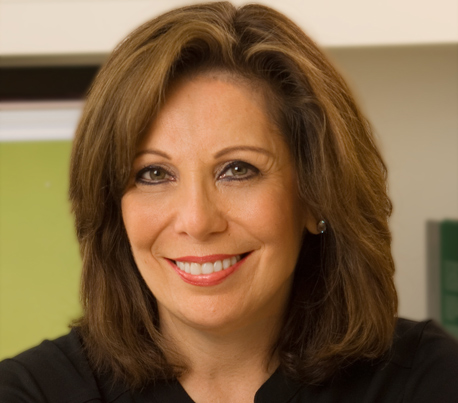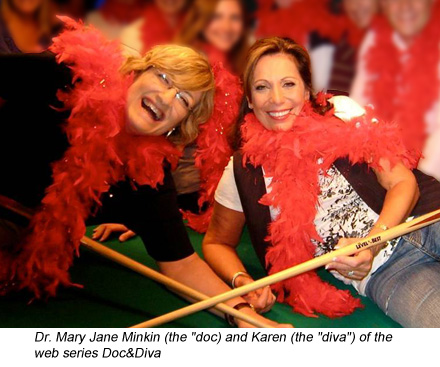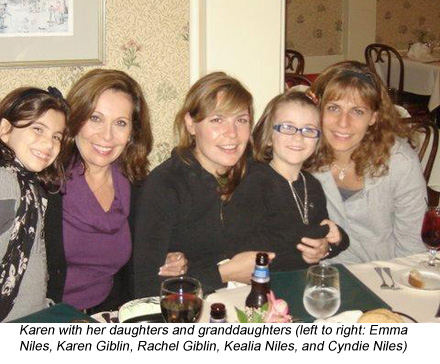
Location: Riverton, NJ
Age: Over 50
Marital Status: Married
Education: SUNY at Stonybrook
When she was 40, in 1991, Karen Giblin had an emergency hysterectomy with the removal of her ovaries and went into surgical menopause. Serving her third term in public office at the time, she returned to work experiencing all kinds of disconcerting symptoms night and day, from hot flashes and night sweats to lack of sleep, irritability and moodiness. She felt like she was “Lost in the Bermuda Triangle,” she says now. “It took a year for me to adjust to estrogen therapy. I was highly symptomatic until we determined the proper dosage,” Karen said.
She quickly realized she wasn’t alone. “Many of my women constituents in Ridgefield, Connecticut, started calling and asking me questions about their menopause. They were sharing intimate details about their experiences, and, for many of them, it was a confusing time. Their questions were not being addressed. In my heart, I felt that providing the answers would make a difference in their lives. I wanted women to have the latest information about menopause, and that was why I designed Red Hot Mamas Menopause Education Programs.” Today, Red Hot Mamas North America has become one of the largest menopause education programs in the United States and Canada.
How did you get the idea off the ground?
I contacted the local district nursing association and created a program to give women medically sound information by tapping into the resources of local hospitals. They provided speakers for Red Hot Mamas monthly meetings. Hundreds of women started showing up at my lectures. When a fire marshall told me I couldn’t host a meeting with so many women, I worked with a nearby hospital which began hosting the program. Other hospitals showed interest, so I started licensing hospitals all over the United States and in Canada.
We have worked in over 200 hospitals and health organizations to provide our free monthly educational programs. Our website, redhotmamas.org, has won numerous health E-awards and provides medically sound information to women. We’re part of the Vibrance Network of health-related websites.

How did you choose the name Red Hot Mamas?
My daughter, who now is 30 and works for me, used to say, ‘Mom, you’re a red hot mama.’ I thought that was apropos, so that’s what I named the program.
Besides the hospital programs, what else does Red Hot Mamas do?
We’re advocates for women and we do research on women’s health. We recently partnered with Sunovion Pharmaceuticals to sponsor a sleep survey conducted by Manhattan Research. More than 900 women shared their sleep problems in depth. Sleep is an important aspect of a woman’s life and we found that it could seriously impact her quality of life, as well as her relationships with her spouse, significant other and business associates. And women just aren’t communicating their sleep issues to their healthcare providers. In my opinion, sleep is an under-recognized and under-treated symptom of menopause.
[To read an interview with Karen all about menopause and its effect on sleep, click here]Are you married?
Yes, my husband of two years is a physician who works on clinical trials. In fact, I met my husband when I was presenting research on women’s sexual dysfunction and menopause.
Do you have children?
Two daughters. They live in Rhode Island and Montana.

Are you still taking hormones?
Yes, I’m on estrogen therapy. I still get hot flashes, especially if forget to change my patch. I believe taking hormone therapy should be based on an individual risk-benefit assessment, and it requires an in-depth discussion between a woman and her clinician. On a personal note, it has has quelled my menopause symptoms and improved my quality of life. It also may help prevent osteoporosis and colon cancer, both of which I have risk factors for. Bottom line, all women need to be an integral part of the decision-making process to take or not to take hormone therapy. There needs to be ample time scheduled with your doctor to have a meaningful discussion about it, to control individual symptoms and to assess personal risk factors. The discussion should also include ways to prevent disease by making healthy lifestyle choices. Then if a woman chooses to take hormone therapy, she should be provided with individualized treatment. There is no one-size-fits-all management plan for menopause.
Do you worry about getting breast cancer?
Of course. Like most women, I worry about developing breast cancer. But, I have regular mammograms, regular medical checkups, and I evaluate my decision to take hormone therapy regularly with my clinician.
Why is there suddenly an overwhelming amount of interest in the subject of menopause?
Because so many baby boomers are entering menopause–approximately 6,000 women a day in the United States. These women don’t sit back and accept the things their mothers did. They’re asking questions. We want to take charge of menopause before it takes charge of us.
Where did you go to school?
SUNY at Stony Brook in New York.
Where did you grow up?
In Baltimore’s Little Italy section; the same area as Nancy Pelosi. In such a small area, our families knew one another. Nancy’s father and brother were both Mayors of Baltimore. Nancy’s mother came from Sicily, and so did my family. My grandparents opened several bakeries, and my aunt and uncle owned De Nitti’s Restaurants in Little Italy for over 60 years. The restaurant is now closed. And my father was a manager of several supermarkets.
Were you friends with Nancy?
Our families knew and always supported each other. Nancy is an honorable and well-respected woman and I’m certainly proud of her achievements.
If you had to give a woman just one piece of advice about menopause, what would it be?
I would tell women to shift their outlooks and discard old myths that surround menopause. Know your body and be able to identify any changes that happen. Become educated about what you can do to help yourself, don’t be afraid to ask questions, and develop a plan of action with your clinician. And last but not least, keep a sense of humor and stay connected with other women. Social support is a key element to maintaining good health and even promotes longevity. That’s why we encourage women to attend Red Hot Mamas programs and log onto redhotmamas.org.

